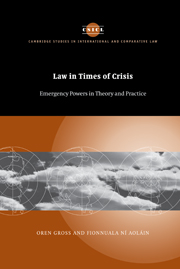Book contents
- Frontmatter
- Contents
- Acknowledgments
- Table of cases
- Table of treaties
- Table of legislation
- Table of international materials
- Introduction
- Part I
- 1 Models of accommodation
- 2 Law for all seasons
- 3 Models of extra-legality
- 4 Five degrees of separation
- Part II
- Bibliography
- Index
- CAMBRIDGE STUDIES IN INTERNATIONAL AND COMPARATIVE LAW
3 - Models of extra-legality
Published online by Cambridge University Press: 03 September 2009
- Frontmatter
- Contents
- Acknowledgments
- Table of cases
- Table of treaties
- Table of legislation
- Table of international materials
- Introduction
- Part I
- 1 Models of accommodation
- 2 Law for all seasons
- 3 Models of extra-legality
- 4 Five degrees of separation
- Part II
- Bibliography
- Index
- CAMBRIDGE STUDIES IN INTERNATIONAL AND COMPARATIVE LAW
Summary
In this chapter we introduce a third model of response to crisis that challenges the assumption of constitutionality on which both the models of accommodation and the Business as Usual models are premised. Before going on to discuss what we call the Extra-Legal Measures model in greater detail, we must distinguish it from another model of extra-legality, which comes out of political realism.
One response to the conundrum that terrorism and violent emergencies present to democratic societies may derive from the realist school of international relations. In international relations the tradition of analysis that is identified with realism focuses on the twin images of power and anarchy. Legal and ethical considerations (and other “non-realist” concerns) are mostly irrelevant and do not apply to the affairs of states. Even for those who are willing to allow for such concerns they are always controlled by, and secondary to, considerations of raison d'état. Dean Acheson's remarks in the context of the Cuban missile crisis are instructive:
[T]he propriety of the Cuban quarantine is not a legal issue. The power, position and prestige of the United States had been challenged by another state; and law simply does not deal with such questions of ultimate power – power that comes close to the sources of sovereignty. I cannot believe that there are principles of law that say we must accept destruction of our way of life … Such a principle would be as harmful to the development of restraining procedures as it would be futile. No law can destroy the state creating the law. The survival of states is not a matter of law.
- Type
- Chapter
- Information
- Law in Times of CrisisEmergency Powers in Theory and Practice, pp. 110 - 170Publisher: Cambridge University PressPrint publication year: 2006
- 3
- Cited by

